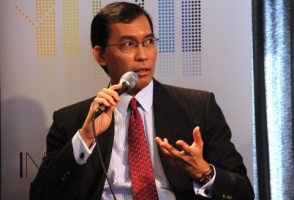Difference between revisions of "Hans B. Sicat"
Przyvylska (talk | contribs) |
Przyvylska (talk | contribs) |
||
| Line 2: | Line 2: | ||
By Hans B. Sicat, President & CEO, Philippine Stock Exchange, Inc. | By Hans B. Sicat, President & CEO, Philippine Stock Exchange, Inc. | ||
| − | [[File: | + | [[File:Hans_B_Sicat.jpg|400x200px|thumbnail|left]] |
“One of the programs that we in Philippines are developing right now is what we are calling “The Inter-exchange”. Some of the people in our companies go to a foreign country, not only to learn the technical stuff, but to understand how things run in another country. This is one way to demonstrate how Inter-Cultural Diplomacy helps us in economics and financial terms, for the future especially because we are living in an increasingly globalized world. We need to communicate with our stakeholders and partners, and I guess that nowadays this issue concerns not only my country, the Philippines, or my region, but that this is a global issue instead”. | “One of the programs that we in Philippines are developing right now is what we are calling “The Inter-exchange”. Some of the people in our companies go to a foreign country, not only to learn the technical stuff, but to understand how things run in another country. This is one way to demonstrate how Inter-Cultural Diplomacy helps us in economics and financial terms, for the future especially because we are living in an increasingly globalized world. We need to communicate with our stakeholders and partners, and I guess that nowadays this issue concerns not only my country, the Philippines, or my region, but that this is a global issue instead”. | ||
[[Category:Statements on the Significance of Cultural Diplomacy]] | [[Category:Statements on the Significance of Cultural Diplomacy]] | ||
Revision as of 13:49, 24 March 2014
What is Cultural Diplomacy to you? By Hans B. Sicat, President & CEO, Philippine Stock Exchange, Inc.
“One of the programs that we in Philippines are developing right now is what we are calling “The Inter-exchange”. Some of the people in our companies go to a foreign country, not only to learn the technical stuff, but to understand how things run in another country. This is one way to demonstrate how Inter-Cultural Diplomacy helps us in economics and financial terms, for the future especially because we are living in an increasingly globalized world. We need to communicate with our stakeholders and partners, and I guess that nowadays this issue concerns not only my country, the Philippines, or my region, but that this is a global issue instead”.
